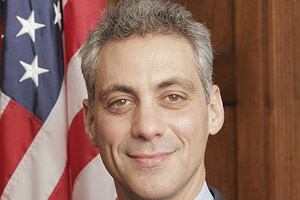There’s plenty in the news about the latest push by the financial industry’s formidable lobbying armada, a coalition of banks’ own outfits, ad hoc front groups, and powerful advocacy organizations speaking for all of Big Finance. It’s also pretty well-known that many of these influence peddlers are well-connected to very people they’re now lobbying. Even so, a new report from the Public Accountability Initiative, “Big Bank Takeover,” uncovers some pretty startling statistics about the finance lobby, a powerful force that’s shaped financial regulation for decades and, more recently, has spent $600 million on lobbying since early 2008.
For instance, the report (pdf), released today, says that 243 lobbyists for the six biggest banks—Bank of America, JPMorgan Chase, Wells Fargo, Goldman Sachs, Morgan Stanley, and Citigroup—and their trade groups used to work in either Congress, the White House, the Treasury, or another federal agency. That comes out to 40 lobbyists per bank who’ve spun through the Wall Street-Washington revolving door. And those 243 lobbyists weren’t paper pushers or interns, either: 33 are former chiefs of staff; 54 used to work for the House financial services committee, which led the House’s effort to write new financial regulation; and 28 were legislative directors for members of Congress. Citigroup, the report states, leads the biggest bank with 55 lobbyists that once worked for the government.
As the Senate continues to craft its own version of financial reform, the man leading the way, Senate banking committee chairman Chris Dodd (D-Conn.), also boasts the most ties to lobbyists at the biggest banks and trade groups. Five former staffers of Dodd’s are now finance lobbyists. Other top members of the influential banking committee like Tim Johnson (D-SD), considered the front-runner to take the chairmanship after Dodd retires, and Richard Shelby (R-Ark.), the committee’s ranking member, each have four former staffers turned lobbyists.
While Dodd and Shelby have said little on these connections, one lawmaker, Rep. Barney Frank (D-Mass.), chairman of the financial services committee, has gone out of his way to bar contact with his former staffers. Last month, Frank ripped a former policy aide who ditched the committee to lobby for a top derivatives corporation even as Congress was working on legislation to rein in derivatives trading. While revolving door lobbyists are banned from lobbying their former employer for a year, Frank extended that block, saying the former aide, Peter Roberson, could never lobby Frank’s committee while he remained the chairman.
But Frank’s crackdown is the exception among members of Congress. And as long as the financial reform debate continues in Congress, these revolving door lobbyists will continue to chip away at a bill that many experts fear is too weak already.
















